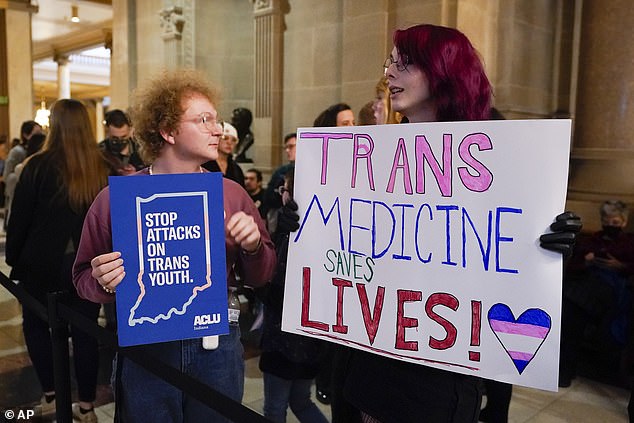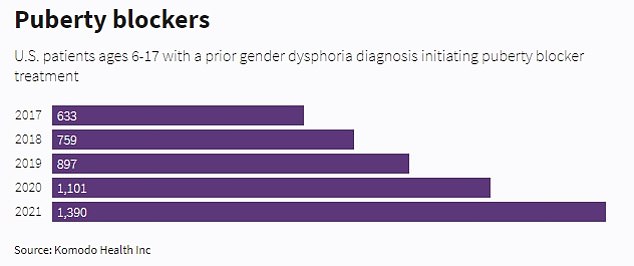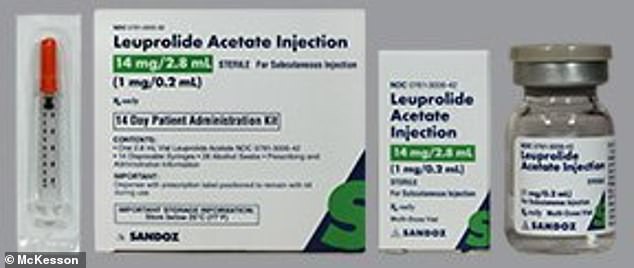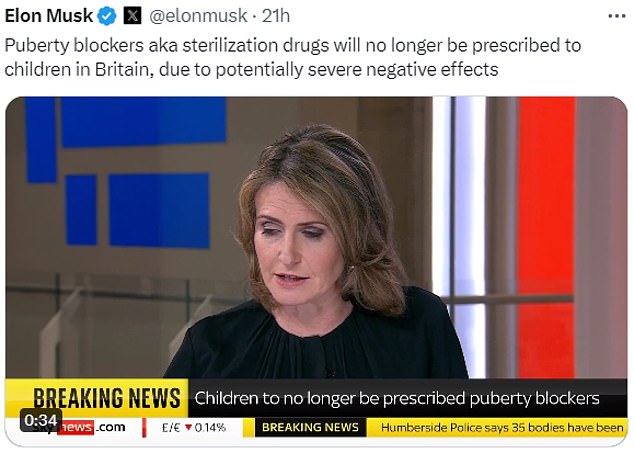Puberty blockers may NOT be reversible and could increase the risk of fertility problems and even cancer in children, Mayo Clinic research suggests
Experts at the Mayo Clinic say puberty blockers can lead to withering testicles, fertility problems and even cancer in the trans children who take them, in the latest study to sound the alarm about transgender medicine.
The findings cast doubt on the ‘reversibility’ of puberty blockers – a key claim by the trans activists promoting the drugs, who say they merely ‘pause’ puberty and buy time for trans children to make decisions about their gender.
Instead, researchers say puberty blockers harm testicular development and sperm production in ways that are not completely reversible and could affect users’ ability to have children as they grow up.
“At the tissue level, we report mild to severe gonadal atrophy in children treated with puberty blockers,” geneticist Nagarajan Kannan and others wrote in the 33-page study.
The Mayo Clinic’s 33-page study revealed puberty blocker damage at the cellular level

Trans activists say puberty blockers and other gender-affirming care are lifesaving among group prone to suicide
‘We provide unprecedented histological evidence demonstrating adverse childhood gonadal responses to the drugs.
The study has not yet been peer-reviewed but has been endorsed by Genspect, a global advocacy group against medical transitions, “Harry Potter” author JK Rowling, Benjamin Ryan, a leading science writer, and others.
It focuses on one of the most controversial issues of our time: whether it is providing medications and surgeries to children who experience gender confusion or ‘dysphoria’ and turn to their parents or doctors for help.
Puberty blockers were originally developed to suppress the hormones of minors who have entered puberty too early.
Today, they are prescribed off-label to a rapidly growing number of trans children.
Proponents of gender-affirming care, as it is known, say it is lifesaving for a group prone to suicide, and that puberty blockers help pre-teens “pause” their puberty and buy time to weigh life-changing decisions.
Critics warn of a rising number of young people identifying as transgender, saying puberty blockers, cross-sex hormones and surgeries are often unnecessary and likely dangerous if counseling produces better results.

Prescriptions for puberty blockers continue to rise in the United States

Most children treated with puberty blockers transition to cross-sex hormones, like this patient at the Blue Mountain Clinic in Montana
Republican lawmakers have banned puberty blockers and other forms of transgender care for minors in nearly two dozen states.
Norway, Finland, Sweden, the Netherlands and Britain are among a growing list of European countries that have limited or completely halted trans interventions in children.
‘Whistleblowers have been saying it for centuries: puberty blockers are not a pause button!’ Genspect reported on the research.
The study “reveals potential irreversible damage to the fertility of patients taking these drugs,” the group added.
For their study, Mayo researchers looked at one of the largest collections of testicular samples for patients aged 0-17 years, including those with gender dysphoria who were and were not taking puberty blockers.
They focused on 87 children, including 16 boys ages 10 to 16 who identified as girls.
Nine of them were already taking puberty blockers: one for just three months, the other for more than four years.
Of the nine who took blockers, two had abnormal features on their testicles that could be noticed on physical examination.
Researchers highlighted the case of a 12-year-old boy who had been taking puberty blockers for 14 months.

Puberty blockers are being prescribed off-label to a rapidly growing number of trans children

Chloe Cole, 19, who transitioned to a man at the age of 13 before later regretting her decision at the age of 16, is among a growing number of young people who are regretting their trans treatments and trying to undo them to make. She says she regrets taking puberty blockers at age 13

Elon Musk famously tweeted about Britain’s decision to phase out puberty blockers for children
Nearly 60 percent of his gonads were “completely atrophied,” they said.
There was also talk of ‘the appearance of microlithiasis’, or small clusters of calcium associated with testicular cancer.
In a 14-year-old patient who had been taking puberty blockers for four years, they discovered that his sperm production cells were hampered.
Scientists at the world-famous clinic said the results were worrying but more research was needed.
The evidence of gonad atrophy and abnormalities from the histological data raises potential concerns about the complete ‘reversibility’ and reproductive fitness of sperm cells in boys taking puberty blockers, the report said.
The study was first reported by Christina Buttonsan independent journalist.
It comes in the wake of the so-called ‘WPATH files’ – leaked messages from the world’s top organization for gender-affirming care, which showed doctors acting more like activists and keeping quiet about the huge downsides of trans medicine.
